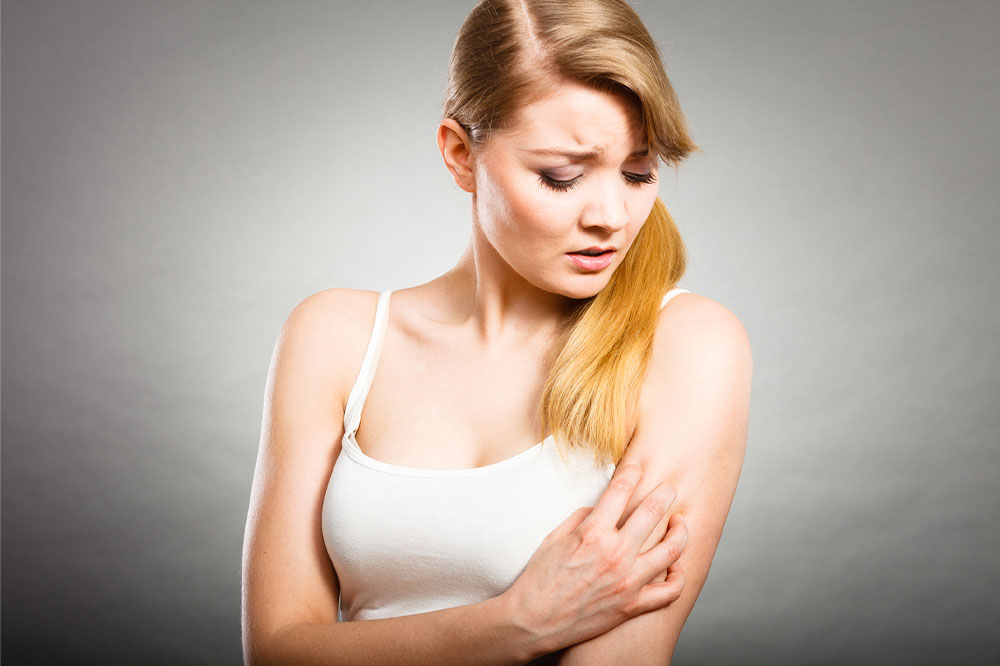5 common skin conditions to be aware of
The skin is our largest organ; it’s more than just an external protective covering. It helps regulates body temperature, keeps out harmful microbes, prevents dehydration, and optimizes vitamin D levels to keep you healthy. And just as every organ is prone to diseases, the skin is no exception. These conditions may be genetic, lifestyle-induced, or situational.

Common skin conditions
Skin conditions refer to a broad range of ailments that affect your skin. These may include diseases caused by bacterial, viral, or fungal infections. At times, skin conditions result from allergies, parasitic reactions, and certain types of cancers. Let’s look at some of the most common skin conditions and ways to have healthy, dewy skin:
Acne
Acne particularly impacts post-pubescent teens; this skin condition is usually caused by the excess production of skin oils, hormonal fluctuations, bacteria, and dead skin cells. Signs of such a condition often occur on the upper back, chest, face, and neck and may leave scars if left untreated.
Acne is of two types: the first is non-inflammatory, which includes blackheads and whiteheads, and doesn’t typically cause facial swelling. The other is inflammatory acne, which includes red and bumpy face pimples. This condition is usually treated through products containing benzoyl peroxide, salicylic acid, and retinoids.
Hives
Hives, also known as urticaria, are raised itchy welts that are a reaction to certain foods, prescriptions, environmental irritants, and pollutants. Stress, illnesses, infections, temperature fluctuations, and even tight clothes may be causal factors. It occurs when your body releases histamine to counter an allergic reaction.
Hives may be flesh-colored, i.e., red and pink, and often hurt when touched. In most cases, this issue subsides within a span of 24 hours. However, a severe reaction may cause chronic hives that last for six weeks or longer.
Hives are usually treated with antihistamines. You may need to follow precautions like avoiding hot water and irritating the spot on your skin. Reducing stress and taking steps to build your immunity also lowers the risk of this skin condition.
Rosacea
Does your skin blush or flush more than usual without external triggers? You may have rosacea—a prevalent condition that impacts facial skin. Approximately 5.5% of the adult population around the world is affected by this issue.
The typical symptoms of rosacea include tiny, red, pus-filled bumps accompanied by burning and dry or scaly skin. Although the root cause of this condition hasn’t been determined, dermatologists attribute it to having spicy foods, hot drinks, chocolates, tomatoes, and citrus fruits.
Rosacea has no cure, but you can take some preventive steps. Avoid having too much caffeine and menthol. Use gentle skincare products that don’t irritate your skin.
Hyperpigmentation
This skin condition causes darker patches of skin due to excess production of melanin in your body. The colors of these patches range from brown and black to even gray, pink, or red. Such spots may be triggered by genetics, hormonal changes during pregnancy or puberty, sun-related damage, or thyroid disorders. The deficiency of vitamin B is a prime factor that causes hyperpigmentation.
Reducing sun exposure, fortifying meals with vitamins, and reviewing the birth control methods being used can help treat a skin condition like hyperpigmentation. Your dermatologist may also advise products containing salicylic acid, skin bleach, or corticosteroids.
Cellulitis
Cellulitis is one of those skin conditions that are triggered by a bacterial infection. Such an issue usually occurs when bacteria enter a skin break after an injury or trauma. This condition affects the skin on the arms and legs but can also occur around the eyes, mouth, and stomach.
Cellulitis is characterized by swelling, redness, bruising, pain, blisters, or tenderness on the skin. In serious cases, it may even cause weakness, chills, and fever. This condition is simple to treat, provided treatment is sought early. A doctor usually advises the use of antibiotics or cool dressings on the site of the infection. In case you experience pain, the dermatologist may advise painkillers. If left untreated, cellulitis may cause tissue damage or even gangrene. It may also spread to the heart, nervous system, or bones through the bloodstream.
Maintaining a healthy lifestyle and knowing about these common skin conditions is the best way to prevent them. Take every measure possible to understand which elements trigger a reaction in your skin and do your best to avoid them. In case you see any unusual changes in your skin, be sure to seek prompt attention to prevent the problem from developing further.


